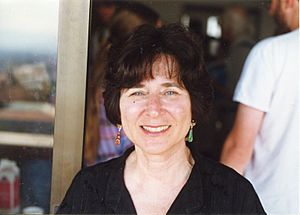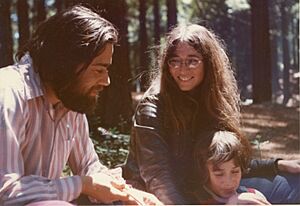Lenore Blum facts for kids
Quick facts for kids
Lenore Blum
|
|
|---|---|

Lenore Blum, Berkeley, California, 1998
|
|
| Born | December 18, 1942 |
| Alma mater |
|
| Known for |
|
| Spouse(s) | Manuel Blum |
| Children | Avrim Blum |
| Awards |
|
| Scientific career | |
| Fields | Computer science |
| Thesis | Generalized Algebraic Theories: A Model Theoretic Approach (1968) |
| Doctoral advisor | Gerald Sacks |
| Doctoral students | Carol Frieze |
Lenore Carol Blum, born on December 18, 1942, is an American computer scientist and mathematician. She has done important work in how computers handle real numbers. She also contributed to cryptography, which is about secure communication, and pseudorandom number generation, which creates numbers that seem random.
Professor Blum was a distinguished computer science professor at Carnegie Mellon University until 2019. She is now a professor at the University of California, Berkeley. She is also well-known for her efforts to help more girls and women get involved in mathematics and computer science.
| Top - 0-9 A B C D E F G H I J K L M N O P Q R S T U V W X Y Z |
Early Life and Education
Lenore Blum was born in New York City into a Jewish family. Her mother was a science teacher. When Lenore was nine years old, her family moved to Venezuela.
After finishing high school in Venezuela at age 16, she started studying architecture. This was in 1959 at the Carnegie Institute of Technology, which is now Carnegie Mellon University. In 1960, with help from Alan Perlis, she changed her focus to mathematics.
In 1961, she married Manuel Blum, who was a student at the Massachusetts Institute of Technology (MIT). She then transferred to Simmons College in Boston. Simmons was a women's college. Even though Simmons didn't have a strong math program, she took math classes at MIT. She earned her Bachelor of Science (B.S.) degree in mathematics from Simmons in 1963.
She continued her studies and received her Ph.D. in mathematics from MIT in 1968. Her Ph.D. paper was about "Generalized Algebraic Theories." It showed strong connections between different areas of mathematics. Her advisor was Gerald Sacks. She had wanted to work with another advisor, but he moved to Princeton University. At that time, Princeton did not accept female graduate students.
Career Highlights
After getting her doctorate, Dr. Blum went to the University of California at Berkeley. She worked there as a postdoctoral fellow and lecturer in mathematics. She worked with Julia Robinson, a famous mathematician. At that time, the Berkeley Mathematics Department did not offer permanent jobs to women. After two years, Dr. Blum's position was not renewed.
In 1971, she helped start the Association for Women in Mathematics. This group supports women in math. In 1973, she joined the faculty at Mills College. Mills College is a women's college near Berkeley. In 1974, she created the mathematics and computer science department at Mills. It was the only computer science program at a women's college at that time. She led this department for 13 years.
From 1975 to 1978, she was the third president of the Association for Women in Mathematics. She was also elected to the council of the American Mathematical Society (AMS) from 1978 to 1980. Later, she served as vice-President of the AMS from 1990 to 1993. In 1979, she received a special teaching position called the Letts-Villard Chair at Mills.
In 1983, Dr. Blum received an award from the National Science Foundation (NSF). This allowed her to work with Michael Shub for two years. In 1987, she spent a year working at IBM.
In 1992, Dr. Blum became the deputy director of the Mathematical Sciences Research Institute (MSRI). She worked there with its director, William Thurston. From 1996 to 1998, she visited the City University of Hong Kong. She worked on her book, Complexity and Real Computation, during this time. In 1999, she became a Distinguished Career Professor of Computer Science at Carnegie Mellon University (CMU).
Helping Women in Computer Science
At CMU, Dr. Blum noticed that not many women were studying computer science. She believed this was partly because women had fewer support networks. For example, they might not have as many friends in the same major to help with schoolwork. This made studying computer science harder and less enjoyable for women.
Instead of changing the courses, she focused on changing the culture. She wanted to make the computer science program more welcoming. She started the Women@SCS program at CMU. This program offered mentoring and outreach activities for women in computer science.
Through this program, which was later led by her student Carol Frieze, CMU saw a big change. The number of women in the undergraduate computer science program grew to almost 50%.
Dr. Blum also helped lead the ALADDIN Center at CMU. This center worked on combining computer algorithms with real-world uses. She also founded Project Olympus at CMU. This program helped new businesses start up in Pittsburgh, often connected to CMU's computer science program.
She left CMU in 2018. This was because of changes in leadership that made it difficult for her and other women to continue their work there.
Important Research
Dr. Blum has made important contributions to computer science.
Blum Blum Shub Pseudorandom Number Generator
One of her key contributions is the Blum Blum Shub pseudorandom number generator. She developed this with Manuel Blum and Michael Shub. This generator creates numbers that look random. It is used in cryptography to keep information secure. Its safety relies on how hard it is to break down very large numbers into their prime factors.
Blum–Shub–Smale Machine
Dr. Blum is also known for the Blum–Shub–Smale machine. This is a theoretical model that explains how computers can work with real numbers. She worked on this with Michael Shub and Stephen Smale. They showed that, like with Turing machines, you can define concepts like NP-completeness and undecidability for this model. For example, using this model, it's impossible to decide if a point belongs to the Mandelbrot set.
She also published a book on this topic with Felipe Cucker, Mike Shub, and Steve Smale. In 1990, she gave a speech at the International Congress of Mathematicians about this work. In 2012, she gave another speech about how her work connects to Alan Turing's ideas.
More recently, she has been working with Manuel Blum on a new idea. They are developing a simple computer model for consciousness. This work is inspired by Turing's ideas and a theory of consciousness called the "theater model." She is currently the president of the Association for Mathematical Consciousness Science (AMCS).
Awards and Recognition
Dr. Blum has received many awards for her work and her efforts to help others.
In 2002, she was chosen to give the Noether Lecture by the Association for Women in Mathematics. This is a special lecture honoring women in mathematics.
In 2005, she received the Presidential Award for Excellence in Science, Mathematics, and Engineering Mentoring. President George W. Bush gave her this award for her work in mentoring girls and women in technology. In 2018, she received the Distinguished Alumnae Lifetime Achievement Award from Simmons University.
She was elected as a Fellow of the American Association for the Advancement of Science in 1979. In 2012, she became an inaugural fellow of the American Mathematical Society. In 2017, she was also selected as a fellow of the Association for Women in Mathematics.
In 2024, she was elected to the American Academy of Arts and Sciences.
Dr. Blum is also featured in a deck of playing cards that highlights important women mathematicians. These cards were published by the Association of Women in Mathematics.
Personal Life
Lenore Blum is married to Manuel Blum. They have a son named Avrim Blum. All three of them studied at MIT. They have also all been computer science professors at Carnegie Mellon University.
 | Sharif Bey |
 | Hale Woodruff |
 | Richmond Barthé |
 | Purvis Young |


